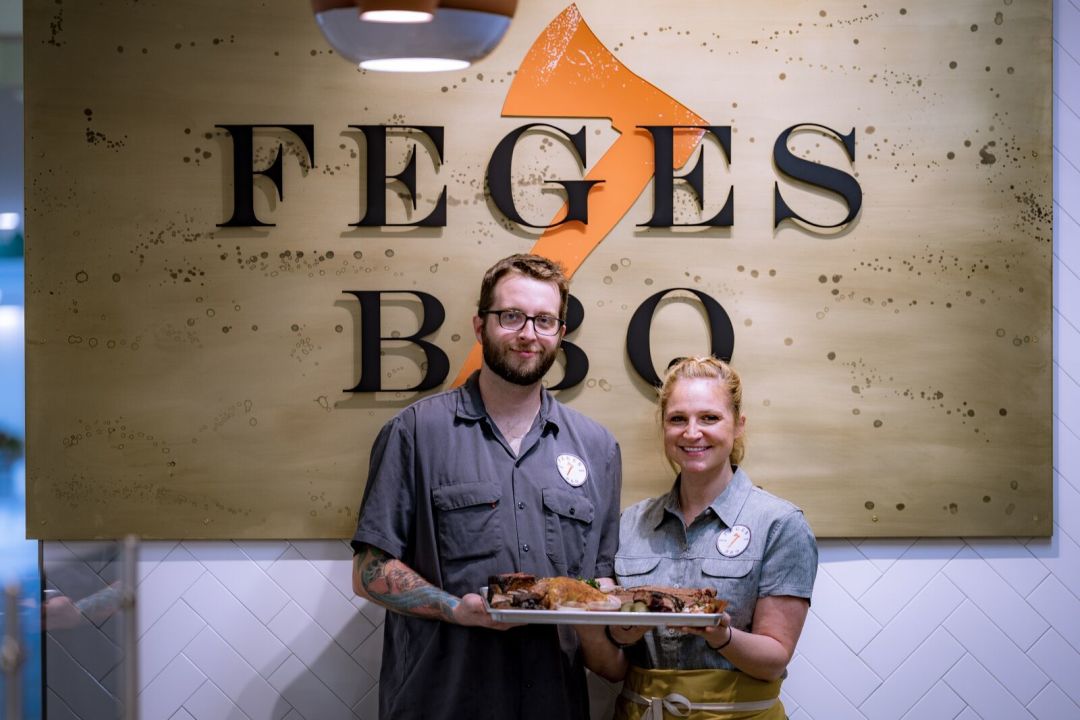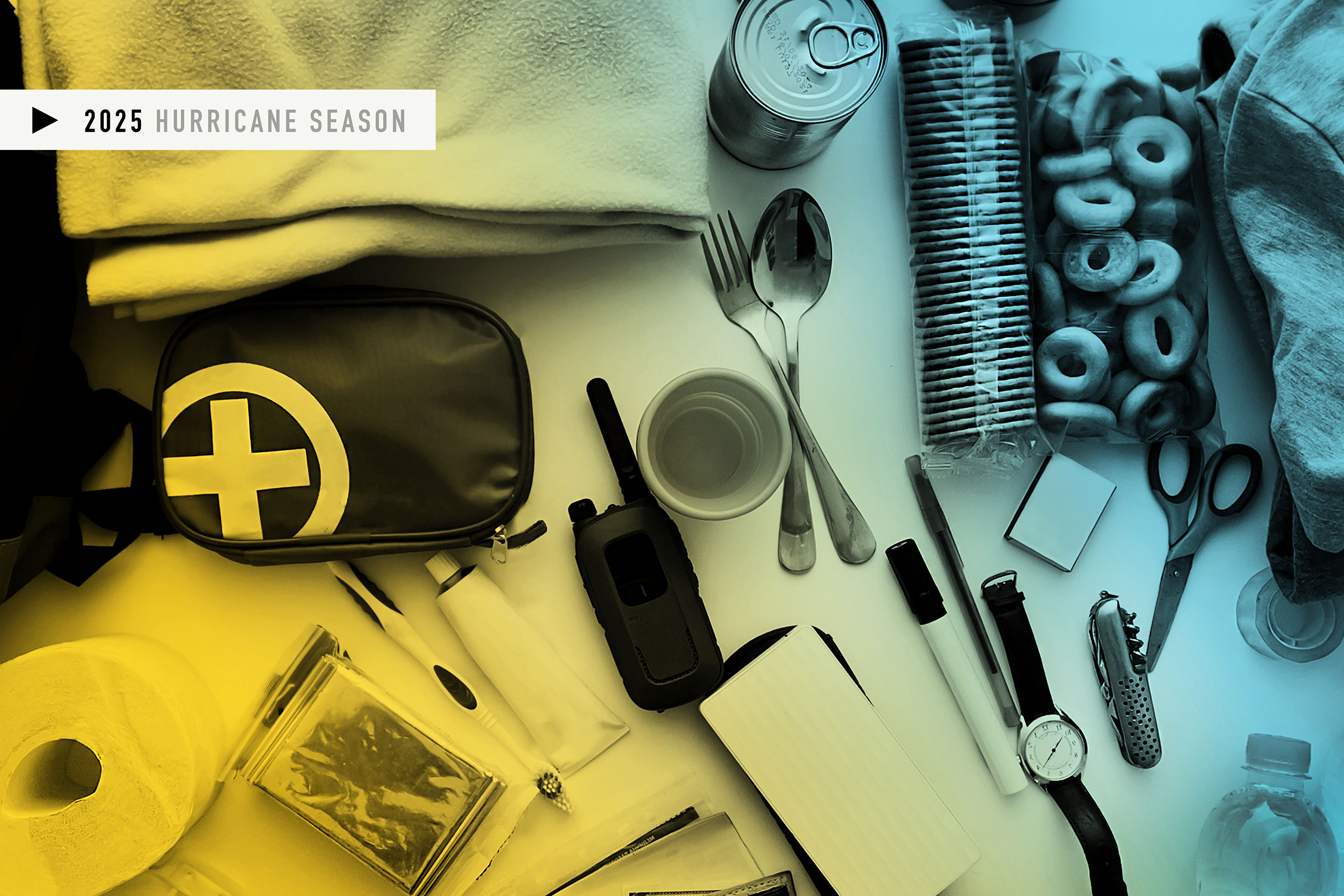Houston Restaurants Use Lessons from Derecho to Prep for Next Storm

Devastating winds followed by an extensive power outage, sheets of rain followed by floods, and days and days of recovery. Yet we aren’t talking about a hurricane, but rather a derecho, the storm phenomenon that took Houston by surprise on May 16. Not only did its path leave hundreds of thousands without power, among other impacts, but it also hurt a group that’s always there for everyone else in a time of crisis: the food and beverage industry.
Without power for days on end, many restaurants experienced losses to inventory and revenue, and employees were left without their usual paycheck. Now, with hurricane season in full swing as of June 1, Houston restaurants are taking the lessons learned from the derecho in attempt to better prepare for what could come.
Cherif Mbodji, director of operations and partner at Navy Blue, Bludorn, and Bar Bludorn, says that derecho was one of the toughest storms the restaurant group has seen since its inception. Within minutes of it hitting, the hospitality group’s three restaurants lost power, which resulted in a loss of nine combined business days. Luckily, the establishments didn’t experience any physical damage.
Navy Blue was the first to get power back, after two days. Meanwhile, Bludorn was out of power from Thursday to midday Saturday, which meant things had to be shuffled around so it could open with a limited menu. The last to get power back was Bar Bludorn, which was restored the following Monday.
To combat loss of inventory with the extended power outage, the group preserved all they had by purchasing ice and dry ice to keep the temperature stable. When this became too much to sustain, Bar Bludorn brought the community together to do a cookout using its inventory so nothing would go to waste. However, inventory losses still added to the financial impact the storms had on the restaurants. Mbodji says they lost about $20,000 in revenue a day—which also meant many of its employees lost a paycheck.
With the unpredictability each future storm can bring, Mbodji says there is only one thing that can be done: creating a game plan that’s adaptable, sustainable, and efficient. He says the restaurants now have plans of action for critical situations, where managers ensure everyone understands what tasks need to be done, such as discarding food that has been compromised.
“I think every closure that we’ve experienced due to weather has taught us something new,” Mbodji says.
Another restaurant that suffered extensive impacts from the storm is Jūn, which is ran by chefs Henry Lu and Evelyn Garcia. Lu says the restaurant lost power the day the storm hit and didn’t get it restored until Wednesday afternoon. Luckily, the restaurant has as walk-in freezer that kept things cold, while other stuff was iced.
However, once the outage went beyond the third day, Lu says it was evident its inventory would be a total loss. Like Bar Bludorn, the restaurant cooked what it had available and gave out hot meals to the community.
“For us it was really about taking care of ourselves, and then making sure that this product at least wasn’t going into the trash, we could at least feed our neighborhood who was severely hit,” Garcia says.
The restaurant lost about $80,000 in revenue and $10,000 in inventory.

Evelyn Garcia is one of the chef and owners of Jun.
Image: Courtesy Jūn
Jūn is a new restaurant that hasn’t yet gone through an active hurricane season. Garcia says the storm was a wakeup call for preparation, especially with the exterior of the restaurant being 90 percent glass. Lu says they are currently doing maintenance and preventative work such as sealing all the windows and walls properly, as well as discussing the use of sandbags for areas that can’t be sealed.
Meanwhile, local restaurant owner Erin Smith experienced similar impacts at Feges BBQ. With every storm that’s hit, Smith says she and her husband Patrick Feges have learned a lot along the way.
For example, Smith says they now keep camping lights and different portable lights that run with charged batteries so if they do lose power, the kitchen—which has no windows or natural light—won’t be as hazardous for employees, especially with its hot surfaces. With the most recent storms and tornadoes, the team is discussing what to do and where to go to ensure that everyone in the establishment is safe, should another weather event like that occur.

Patrick Feges and Erin Smith of Feges BBQ lost power for several days during the derecho.
Image: Robert Jacob Lerma
“It’s as simple as having a plan, because it obviously can be a scary situation, but just having a plan and ushering everyone into that plan in the moment to help keep everybody calm is really important,” Smith says.
Looking into the future for this hurricane season, Smith says they are having conversations about how to prepare for storms of even stronger magnitudes. Every restaurateur we spoke to has had conversations surrounding generators, but Smith notes that this is not always a great solution.
“Just because a business gets a generator, does not mean that they’re going to necessarily be able to save product,” Smith says. “And one thing that I think is really important for people to understand is that even if you can keep something refrigerated for seven days, if you’re not serving it, it will spoil.”
Although a generator could be helpful in cutting some losses, she says it isn’t a realistic expectation for every business. One local restaurant that doesn’t see a generator in its future is 93 Til. Lung Ly, the chef and owner, says the restaurant lost power Thursday and didn’t get it restored until Sunday morning, meaning it was closed during its busiest days. During that time, a lot of the inventory had to be tossed due to the little storage space 93 Til has. In total, Ly estimates the restaurant lost about $40,000—and on the same week that sales tax and payroll was due.
Ly says a generator is out of his budget, but he’s instead focusing on short-term bandages, like more ice chests for storage, to get through this coming hurricane season. He learned another huge lesson from the derecho: “I’ll take those weather alerts seriously in the future, and be more prepared, such as having to-do lists for staff readiness in the event of another power outage,” Ly says.
Ly notes he used his own money to get inventory restocked while shut down, which meant he then couldn’t pay himself back because of the revenue loss. With this huge financial hit, Ly decided to turn to the Southern Smoke Foundation for help—another good source he says should be top of mind for the food and beverage industry should another detrimental storm hit in the future.
Southern Smoke, which is overseen by executive director Lindsey Brown (who cofounded the organization in 2015 with her husband and famous chef Chris Shepherd), is a nonprofit that acts as a safety net for the food and beverage industry.
“I think the biggest thing that sets us apart from other major crisis relief organizations is that we give directly to the individual,” Brown says. “Anything that gets you in crisis, we will help you get out of it.”

Lindsey Brown serves as the executive director of Southern Smoke.
Image: Julie Soefer
The Bludorn restaurants, Feges BBQ, and Jūn also had employees reach out to Southern Smoke for help. After the derecho, Brown says the nonprofit received more than 500 crisis applications for assistance from Houston-area employees and has granted $260,500 to nearly 300 of those people.
With the vast number of applications and the nature of the storm, Southern Smoke created a system based on how long the restaurants were out of power, if the employees also lost power, and if there was a loss of groceries. And although this quick yet mighty storm took Houston by surprise, Brown says there are steps individuals can take should this happen again.
The foundation’s tips include collecting copies of paystubs, having an active email, storing important documents properly, creating an emergency supply kit, and knowing how to find help from other resources.
“We try and remind the broader community that opportunities like this are your chance to give back to those people that are always giving to us,” Brown says. “They’re always the people that think about themselves last, and this is when you can step up and help them.”




